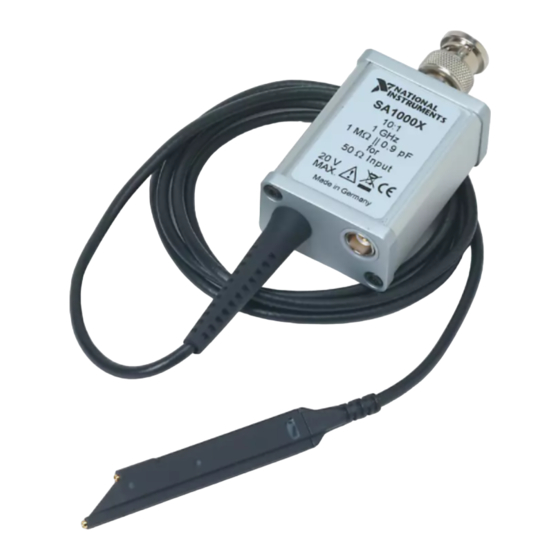Table of Contents
Advertisement
Quick Links
Advertisement
Table of Contents

Summary of Contents for National Instruments SA1000X
- Page 1 SA1000X Safety, Environmental, and Regulatory Information 2022-07-08...
- Page 2 About the SA1000X........
- Page 3 SA1000X Safety, Environmental, and Regulatory Information About the SA1000X This guide describes how to use the SA1000X active probe and contains specifications and safety, environmental, and regulatory information. Read this document for information about installation, configuration, and operation of this equipment before you install, configure, operate, or maintain this product.
-
Page 4: Verifying The Kit Contents
Z-ground ■ ■ Safety To avoid personal injury and to prevent fire or damage to the SA1000X, review and comply with the following information. Caution The protection provided by the model can be impaired if it is used in a manner not described in the user documentation. - Page 5 SA1000X Safety, Environmental, and Regulatory Information Attention La protection apportée par le modèle risque d'être endommagée s'il est utilisé d'une autre façon que celle décrite dans la documentation utilisateur. Caution The accessories supplied with the probe have been safety tested.
-
Page 6: Operating Basics
2.54 mm pitch. When using the SA1000X, ensure that the input coupling of the measuring instrument is set to 50 Ω and that the SA1000X is connected to the power supply. The SA1000X is protected against electrostatic discharge voltage (ESD). - Page 7 When to Calibrate the SA1000X The first time the SA1000X requires user calibration depends on how much time has elapsed between its factory calibration and the first time you use the probe. Complete the following steps to determine when you need to perform your first calibration of the SA1000X.
-
Page 8: Maintenance
Definitions and Conditions Specifications are typical and are published as general information to the user. Specifications are valid under the following conditions unless otherwise noted. SA1000X warmed up for at least 30 minutes ■ Environmental conditions within the probe's specified limits ■... -
Page 9: Input Impedance
Figure Related reference Safety Voltage ■ Calibration ■ Input Impedance Figure 2. SA1000X Typical Input Impedance. Input impedance decreases as the frequency of the applied signal increases. 100 k 10 k 10 k 100 k 10 M 100 M... - Page 10 Safety Voltage Connect only voltages that are below these limits. Voltage |Peaks| ≤20 V Figure 3. SA1000X Maximum Input Voltage Versus Frequency. Derate voltage according to the frequency of the signal you are measuring. Maximum Input Voltage Dynamic Measuring Range...
-
Page 11: Environmental Characteristics
SA1000X Safety, Environmental, and Regulatory Information voltage measurements include signal levels, special equipment, limited-energy parts of equipment, circuits powered by regulated low-voltage sources, and electronics. Note Measurement Categories CAT I and CAT O are equivalent. These test and measurement circuits are for other circuits not intended for direct connection to the MAINS building installations of Measurement Categories CAT II, CAT III, or CAT IV. -
Page 12: Physical Characteristics
Table 1 Table 2 for a list of necessary equipment and, where applicable, model recommendations for calibration of the SA1000X. If you do not have the recommended equipment, select a substitute calibration standard using the specifications listed in the Requirements column. - Page 13 SA1000X Safety, Environmental, and Regulatory Information Equipment Recommended Where Used Requirements Model Verifying Zero Offset Measurement error: ■ (× 1) <±25 µV Resolution: <1 µV ■ Precision DC NI PXIe-5413 Verifying DC DC signal generation: ±5 V source Accuracy Table 1. Required Instrumentation...
-
Page 14: Test Conditions
Calibration Overview Refer to When to Calibrate the to determine when you first need to calibrate the SA1000X. Complete the following to verify that the performance of your SA1000X is within specification: Verifying DC Accuracy ■ Verifying Zero Offset ■... - Page 15 SA1000X Safety, Environmental, and Regulatory Information Verifying DC Accuracy 1. Connect the test system as follows: Figure 4. Verifying DC Accuracy Test Connections PXIe-4082 6½-Digit DMM PXIe-5413 20 MHz 16-Bit AWG PXIe-4082 6½-Digit DMM 1. SA1000X 2. SMA (f)-to-probe tip adapter 3.
- Page 16 SA1000X Safety, Environmental, and Regulatory Information 2. Connect power to the SA1000X and warm up the probe for at least 30 minutes. 3. Configure the DMMs with the following settings: Setting DMM 1 DMM 2 Function DC Voltage Resolution 6.5 digits...
- Page 17 3. BNC feed-through terminator 4. Double banana (m)-to-BNC (f) adapter 5. DMM (HI and LO) 2. Connect power to the SA1000X and warm up the probe for at least 30 minutes. 3. Configure the DMM with the following settings: Function: DC voltage ■...
-
Page 18: Environmental Guidelines
SA1000X Safety, Environmental, and Regulatory Information Compliance and Certifications Environmental Guidelines Notice This model is intended for use in indoor applications only. Environmental Management NI is committed to designing and manufacturing products in an environmentally responsible manner. NI recognizes that eliminating certain hazardous substances from our products is beneficial to the environment and to NI customers. - Page 19 SA1000X Safety, Environmental, and Regulatory Information CE Compliance This product meets the essential requirements of applicable European Directives, as follows: 2014/30/EU; Electromagnetic Compatibility Directive (EMC) ■ 2011/65/EU; Restriction of Hazardous Substances (RoHS) ■ Product Certifications and Declarations Refer to the product Declaration of Conformity (DoC) for additional regulatory compliance information.















Need help?
Do you have a question about the SA1000X and is the answer not in the manual?
Questions and answers